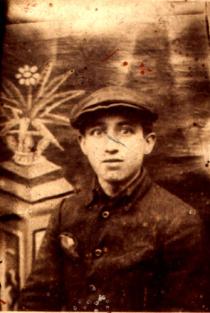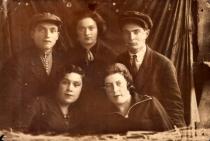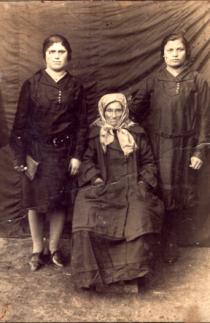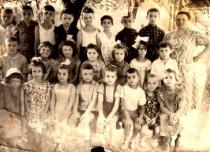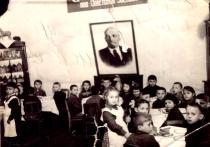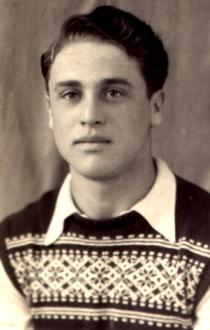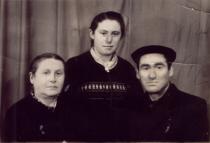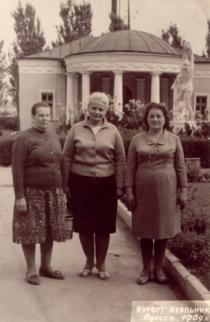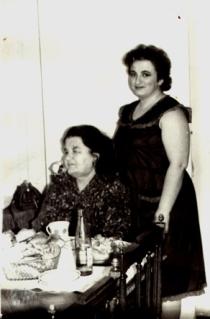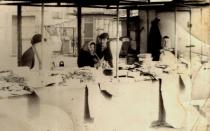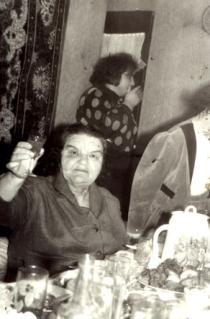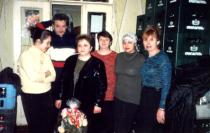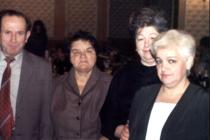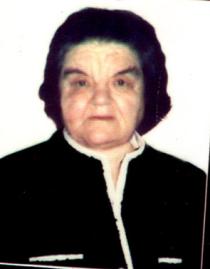
Sonia Leiderman
Mogilyov-Podolskiy
Ukraine
Date of interview: July 2004
Interviewer: Ella Levitskaya
Sonia Leiderman is a lady of average height. There are hardly any signs of gray in her thick wavy hair. Sonia has one leg amputated up to above her knee. She cannot walk and moves around her apartment in a wheel-chair. Sonia is a sociable lady full of energy. She readily bursts into laughter and jokes. She only finished 3 forms at school, but she has a bright natural sound mind. She surprises me with the depth of her thoughts and accurate expression of her mind. She lives with her daughter, who takes care of her. Sonia’s daughter and her son-in-law are away from home going to work and Sonia feels lonely. She enjoyed telling me about her life and felt happy about having a listener and somebody to talk to. Those people, who have more grounds to feel optimistic would envy Sonia’s optimism and her sense of humor.
My family background
Growing up
During the war
After the war
Glossary
My father Itzyk Weisenberg was born in 1899 in Mogilyov-Podolskiy [315 km from Kiev] Vinnitsa province of the Russian Empire. I never saw my father’s parents. They died, when my father was just a teenager. My grandfather’s name was Shmul. As for my grandmother, I don’t know her name. I don’t know what my grandfather did to earn his living. My grandmother was a housewife like all married Jewish women at the time. My father didn’t tell me about his childhood. Of all his brothers and sisters I only knew his younger sister Klara, Haya in Jewish. [common name] 1 She also lived in Mogilyov-Podolskiy. Klara was married and her family name was Shtern. She had one daughter, whose name was Lisa. Klara’s husband left his family shortly after his daughter was born. Klara never remarried. She worked as a seamstress at home, fixing bed sheets and altering old clothes.
Mama’s parents came from the Jewish town of Ozarintsy near Mogilyov-Podolskiy [12 km from Mogilyov-Podolskiy, 305 km from Kiev]. I think that my grandfather Yevzel Gempeld and my grandmother Fania were born some time in the late 1860s. My grandfather was a tailor. Before the revolution of 1917 2 he owned a small shop, which was expropriated after the revolution and my grandfather did sewing at home. His younger son Mikhail assisted him. My grandmother was a housewife, which was quite common for Jewish women. They had many children, but they all left their parents’ home before I was born. During the Civil War 3 some of my mother’s brothers and sisters moved to the USA. There were no contacts with them, and mama never told us anything about them. Perhaps, she was just afraid to talk about them considering that in the 1930s it was not safe for Soviet people to have relatives abroad 4. Soviet authorities did not appreciate people corresponding with their relatives abroad. Thos people might be arrested and deported. So, the best thing was to forget these relatives. Mama was born in 1901. I also knew mama’s older brother, whose name I don’t remember, her older sister Riva, born in 1898, and her younger brother Mikhail, Moishe in Jewish, born in 1909, the youngest child in the family. He was single and lived with my grandparents in Ozarintsy. Riva married Motl Kagan, a shochet in her town. Riva and her husband lived in their house not far from my grandparents. Riva had three daughters: Hana, Vera and Yekaterina. Mama’s older brother learned tailor’s vocation from his father. He lived with his family in Luchinets village [30 km from Mogilyov-Podolskiy, 300 km from Kiev], was married and had two sons. I don’t remember his wife or children’s names since we did not communicate.
Ozarintsy was a big village divided into two parts: Ukrainian and Jewish neighborhoods. There were many such villages in Vinnitsa region. Vinnitsa province was within the Pale of Settlement 5 during the czarist regime. Jewish families lived in the central part of the village. There were about 200 houses in the Jewish Ozarintsy. Of course, residents of the Ukrainian and Jewish areas socialized and had friends, but each part still had its own way of life: Ukrainian and Jewish. There were no conflicts, Ukrainians were invited to Jewish weddings and Jews went to Ukrainian weddings. Jews were craftsmen: tailors, shoemakers, blacksmiths, carpenters and tinsmiths. There was no anti-Semitism in the village and Ukrainian and Jewish residents got along well. Jews spoke Yiddish, but also knew Ukrainian and Ukrainian residents could speak Yiddish.
Many Jews were also engaged in farming and cattle breeding. They lived in the center, but had their fields outside the village. The Jewish community supported older people and widows with children. There was a synagogue and a shochet in the village. There was also a cheder before the revolution, but after the revolution it was closed and turned into a Jewish primary school with teaching in Yiddish. There was a Jewish cemetery, a hospital, a drugstore in hospital in the village. Actually, there was everything necessary the villagers needed to live their life.
Before and during the revolution and the Civil War there were pogroms 6 in Ozarintsy made by numerous gangs 7: Denikin troops 8 also made pogroms. Mama told me that during pogroms Ukrainian villagers gave shelter to Jewish families, risking their lives.
All Jews in Ozarintsy were religious. Even when the Soviet regime struggled against religion 9, Jews never gave up observing Jewish traditions they went to the synagogue, celebrated Sabbath and Jewish holidays at home. The younger generation was not so religious or even gave up religion.
I remember my mother’s parents. My grandfather was a stout man of average height. He wore a black suit. At home he always had a black yarmulke on, and wore a hat to go out. He didn’t have payes, but all old men in Ozarintsy had beards and my grandfather had a big black beard with streaks of gray. My grandmother was short and thin. She always wore skirts with gathers and long-sleeved blouses. She always covered her head with a black kerchief. My grandfather and grandmother were religious. They celebrated Sabbath and Jewish holidays. Their children were also religious. Mikhail, whom I knew well, always went to the synagogue with grandfather on Sabbath and Jewish holidays. My grandmother went to the synagogue on Jewish holidays like other Jewish women.
Mama told me that she always wanted to leave Ozarintsy for a big town. Of course, Mogilyov-Podolskiy can hardly be called a big town, but my mother, a common Jewish girl from a small Jewish village, found it attractive. After the revolution she moved to Mogilyov-Podolskiy. I don’t know whether my mother had any education at all: she could hardly read words or write her own surname. She was looking for a job and was offered a job of housemaid in a Jewish family. Mama worked for few families doing shopping, cleaning and baby sitting for them. I don’t know how she met my father. Mama hardly ever told me about her life. My parents got married in 1922. They were both poor, and a big wedding party was out of the question. There was a chuppah installed in the yard of my mother parents’ house, and then my grandmother made a small wedding dinner with my mother and father’s relatives. After the wedding my parents returned to Mogilyov-Podolskiy. They rented half of a small house in the center of Mogilyov-Podolskiy, in the Jewish neighborhood. There were two small rooms and a kitchen in the house. The kitchen was behind a partition in the room. There was a big stove heating the rooms and the kitchen, and mama also cooked on this stove. Water was fetched from the well three houses away from where my parents lived. There was no plot of land near the house. The houses adjoined to one another in the center of the town. There were 2 old apple trees near the house, and a wood shed and a toilet in the backyard. My father made a table, wardrobes and cupboards, plank beds and stools for the house.
Mogilyov-Podolskiy was a quiet and cozy town in the south buried in verdure, surrounded with the hills covered with woods. It is located on the bank of the Dnestr River, and the other bank of the river was the territory of Moldavia or Bessarabia 10. Before 1940, when Bessarabia belonged to Romania, Mogilyov-Podolskiy was a border town with the middle of the Dnestr River being the border line between the USSR and Romania. In 1940 Moldavia was annexed to the USSR. Jews constituted over half of the population in the town. They resided in its central part. They lived in small houses. Wealthier houses had tin sheet or tiled roots while poorer houses had thatched roofs. Ukrainians, Russians and Moldavians lived in the suburbs where they could have more land to do farming and supply food products to the town. Jews were craftsmen and traders and worked at the mechanical plant. There were few synagogues before the revolution. After the revolution there were only two synagogues left. They operated till World War II. The main synagogue was near the market in the center of Mogilyov-Podolskiy. Another one, a smaller synagogue was located near the railway station. There was a shochet working near the market, and housewives brought chickens to the shochet to have them slaughtered. There was a Jewish 4-year primary school in the town. There was a Jewish, Orthodox-Christian and Catholic cemeteries on the hills.
Mama was a housewife after getting married. Their first daughter was named Zina – this is a Russian name, Zisl in Jewish; she was born in 1924, their second daughter Etia was born in 1926. I was the third daughter in the family. I was born in 1932. I was named Sonia, and my Jewish name is Sosl. My younger sister Nyusia was born in 1939. She was given the Jewish name of Hana. She was called affectionately Hanusia - Nyusia at home, and this name was put down in her birth certificate. It was hard for my father to provide for the family of six of us. My father made plain furniture, doors and window frames. We could hardly make ends meet. Nyusia and I wore our sisters’ clothes that they had grown out of.
My parents were religious, and however hard the Soviet regime struggled against religion, they never gave up their belief. They observed Jewish traditions and could read their prayer books in Hebrew. They prayed at home every day. Their generation of Jews in Mogilyov-Podolskiy was religious. We always celebrated Sabbath at home. Mama made dough in a big wooden tub on Friday morning to make bread for a whole week, and a smaller tub with dough for Saturday wheat challot. Hen she finished with bread, mama cooked the Sabbath dinner and food for Saturday. Mama tried to do no work on Sabbath. We were poor, but mama always made something special for Sabbath. In autumn, when fish was not so expensive, she made gefilte fish, chicken broth with homemade noodles – we could have these almost every Sabbath. On Friday evening the family got together. Mama lit candles and prayed over them. Then we sat down to dinner. On the next morning my father went to the synagogue. Mama went to the synagogue on Jewish holidays like other Jewish women. When my father came home from the synagogue, he read his prayer book. My older sisters went out with their friends and I sat beside my father listening to his wonderful stories about David and Goliath, Isaac’s sacrifice and granting the Torah to Moses. Of course, I didn’t know these were the Biblical stories and listened to them as if they were fairy tales.
We celebrated Jewish holidays at home. I particularly remember Pesach. There was a Jewish bakery not far from our house. About a month before Pesach this Jewish bakery switched to baking matzah. Mama always made savings for Pesach. She bought sufficient matzah to last for 8 days, when no bread was allowed. The matzah stocks were kept on the attic where we also kept our special crockery for Pesach. Mama and my older sisters made a general clean up of the house before Pesach. All corners were cleaned and all things were taken outside to be cleaned. On the eve of the holiday mama removed all bread and bread crumbs from the house and only then she could take the matzah and crockery into the house from the attic. Mama bought a chicken and had it slaughtered by the shochet. She cooked a chicken, and made dumplings from the matzah flour and eggs. Mama made matzah and egg, corn and potato puddings and made pancakes from matzah flour that we ate with jam. On Pesach my parents went to the synagogue in the morning, and Zina and Etia went with them. I stayed at home, being too young. My father conducted seder on the first evening of Pesach. I was a quick girl and always managed to steal the afikoman, a piece of matzah to crown the seder and gave it to my father for ransom that was usually a toy or some sweets. There was a wine glass filled with wine for Elijah the Prophet, and the door was kept open for him to come into the house. My father and mother recited prayers and we sang Pesach songs. Another big holiday was Yom Kippur, the Judgment Day. The Kapores ritual was conducted on the eve of the holiday. Mama bought a white rooster for the father and white hens for us. The hen was to be taken by is tied legs, turned around the head with the words: “May you be my atonement”. Then these hens were slaughtered and mama cooked broth with them. Adults had a sufficient dinner before the first star appeared in the sky and then fasted for 24 hours. Children either missed one meal or didn’t fast at all. In the morning of Yom Kippur all Jews of Mogilyov-Podolskiy went to the synagogue. Everything looked very festive. Men wore black suits and hats, and women dressed up and wore silk shawls on their heads. They all were carrying candles to the synagogue. They had to pray at the synagogue a whole day till the first evening star appeared in the sky. Then they returned home to have dinner with the family. I also remember Chanukkah. All visitors gave children coins. Every day mama lit another candle in a big 9-candle stand – the chanukkiyah. We also celebrated other holidays, but I don’t remember any details. So we lived till the Great Patriotic War 11 began.
Both of my older sisters went to the Russian general education school. I also went to this school in 1938, when I was 6 years old, but I was a tall and strong girl. My sisters taught me to read and write a little, and our teacher allowed me to come to the first form, though other children were admitted to school at the age of 8. I didn’t study very well. I was a vivid girl and it was hard for me to sit still 45 minutes that our lessons lasted. The teacher always had to talk with mama about me turning around at school and talking to other children. I became a young Octobrist 12 at school. I also sang in the choir and went dancing at school. There were Jewish children and Jewish teachers at school. There was no anti-Semitism at school. I think anti-Semitism appeared after the war.
In June 1941 my summer vacations began. Etia finished the 6th form and Zina was having her graduate exams after finishing the 8th form. The summer was warm. I spent time at the riverside and walked and played with my friends. On Sunday, 22 June, mama promised that we would go to the cinema. We were looking forward to Sunday since we didn’t often go to the cinema. In the morning mama was doing housework and I was playing outside with my friends, when my father came into the yard and said that he heard on the radio that Germany had attacked the USSR and that Belarus and Kiev were already bombed. All I knew about war was that boys played the war, and I could not understand why my father looked so worried and why my mother burst into tears. I was 9 years old and did not understand that this was the end of my childhood.
My father received a summons to the recruitment office. My parents decided that Mother and the children should leave the town for a village to be on the safe side. Our neighbors were going to Chernevtsy near Mogilyov-Podolskiy [30 km from Mogilyov-Podolskiy, 290 km from Kiev], and my parents decided to go with them. They hired a wagon and packed only the most necessary belongings. When we reached Chernivtsy, we rented a room from a local Jewish family. My father went to the mobilization point in Vinnitsa. Shortly afterward we heard that Germans occupied Mogilyov-Podolskiy.
In Chernevtsy mama and my older sisters went around village houses asking for work. Occasionally they got some job, but at times they returned without any earnings. I had to look after my younger sister Nyusia. We were always hungry. Mama left few boiled potatoes or a little cooked cereal for a day. We ate this miserable food at once and kept waiting till mama and sisters would come back and bring some food. I also wanted to help the family. Once I talked our landlady into taking my sister in her care while I went out looking for work. For some reason I had no doubts that I could do any work. I knocked on the door of the house that looked wealthier than other houses to me. The owner of the house came out and I asked her about work. She asked me what I could do and I replied that I could do anything she needed. She gave me a spade and a bucket and told me to dig potatoes in her vegetable garden. I had never done this before and even saw a spade for the first time in my life. Some time later the mistress of the house came out to look how I worked. When she looked into the bucket, she clasped her hands and said that she would give me some food, but I had to stop digging potatoes, or she would never have potatoes for the winter. Each potato in the bucket was cut by halves in the bucket. She gave me some food and also packed the potatoes I had dug out for me to take home.
Some time later Germans came to Chernevtsy. They started mass shootings of Jews. They killed 13 men in one day, and then – 12 more. Jews were not allowed to come into streets after dark. Germans arranged raids. They sent the captives to the Pechora camp 13. People said there were no survivors in this camp. We moved into a Ukrainian house for reasons of safety. One night another raid began and our landlady told us to take a hiding. Mama, little Nyusia and my older sisters hid in the cellar. There was no space left for me to come with them, and our landlady hid me in her house covering me with a blanket. A German and a Ukrainian policeman came into the house. The policeman noticed me, but he didn’t say anything.
It was not safe to stay in Chernevtsy and mama decided we should go back to Mogilyov-Podolskiy. Our landlady’s husband rode us there in his wagon. There was a Jewish ghetto already in Mogilyov-Podolskiy. Our house was within its boundaries, and there were already Jews from Romania and Bukovina 14 accommodated in it. There were too many of them and they didn’t want to let us in. Mama begged them to let us stay in the kitchen. There was nothing left in the house: while we were away local people took away our furniture, utensils and clothes. We slept on rags and newspapers on the floor. Germans had left the town by then and there were Romanian guards in the house. Villagers from neighboring villages brought food products to sell or exchange by the fence of the ghetto. We had no money or anything to offer a deal for food. The villagers got thirsty while bargaining and then I went to the fence with a kettle of water offering them to drink. They took sips of water and threw me an apple, a potato or a piece of bread over the fence. So I managed to get however little food for a day. Of course, this was a miserable contribution into the family of five of us, but this was still better than nothing. I also managed to get out of the ghetto, when there were no Romanian guards or policemen nearby. I didn’t look like a Jew, but rather like a village girl. I walked barefoot, had plaits and a kerchief on my head. We needed something to stoke the stove. We got together in a group of 4-5 of us to go to the forest. We usually went there in the dark and were scared. 4We didn’t have knives or axes and had to use our teeth to break off thicker branches. Later I started leaving the ghetto looking for a job in the town. Housewives hired me to do cleaning for them, wash dishes or sit with their children. They didn’t give me money, but gave me food. Mama and my older sisters also went out looking for work, but it became more and more difficult to find a job. We decided to leave the ghetto and go to Ozarintsy where my mother’s relatives lived. We left the ghetto one night. Mama and my older sisters took turns to carry little Nyusia. We walked all night till we got to my grandfather and grandmother’s house in Ozarintsy. There was also a ghetto there. My grandparents and my mother sister’s houses were within the boundaries of the ghetto. My mother sister’s husband was at the front, and she and her daughters lived with grandmother and grandfather. Some Jews from Bukovina were accommodated in their house. Our relatives were happy to see us alive. They told us that my mother’s brother Mikhail perished on the first day of occupation. He and other men were at the synagogue, when Germans came into the town. They surrounded the synagogue and began to shoot. Few men escaped. Mikhail and other men were killed inside the synagogue. They were found embracing each other. This ghetto was even more unsafe than the ghetto in Mogilyov-Podolskiy: the town was small, and they watched over each Jewish inmate of the ghetto. My mother’s parents and Riva had some belongings that they could deal for food, but there were five of us and they could not manage to provide food for all of us. There were new groups taken to Ozarintsy and every now and then there were raids and the captives were killed. It was scaring. Every night we sat quiet fearing to have lights in the house to not attract attention to us. So we had nothing left, but return to Mogilyov-Podolskiy. We left one night. There was another Jewish woman with a child and a Russian family going to Mogilyov-Podolskiy. On our way we met a Romanian soldier. He ignored us, but approached the Jewish woman, who had a typical Jewish appearance and hit her so hard that she fell on the ground. He turned away and left. He could have killed her… We went on. We managed to get into the ghetto unnoticed and went to our house, but there was another family living in our kitchen. My papa’s sister Klara gave us shelter. She lived with her daughter in a small room in her house, and when we came to live in her house, there were already 7 of us in a 10-square meters room. We were just stuffed in the room. There was a bed where Klara and her daughter Lisa slept and a big table in the room. Mama and Nyusia slept on the table, and my sisters and I slept on the floor. Almost all inmates of the ghetto lived like this. The wells were dirty and the water in them stunk. There was no soap to wash ourselves or our clothes. Everybody had lice. Then epidemics of typhus occurred one after another. There was an enteric, spotted fever and relapsing typhus in the ghetto. If one fell ill in a house, the rest contracted it. Mama also fell ill with typhus. A woman from Bessarabia, a medical nurse, living in Klara’s house, covered mama with wet rags and told us to remove them only when necessary. Thanks to her, we did not contract typhus. In winter 1943 Klara fell ill with typhus. At that time Romanians were sending ill people to hospital to make injections. Only later we got to know that people were dying from these injections. Those were medical experiments on people. Klara was taken to hospital where she had an injection. Mama took her back home. Klara died few days later. Mama was very weak. My cousin Lisa and I took Klara to the Jewish cemetery on sledges. There was a pit where all dead were thrown and when it was filled with dead bodies, there was lime added to and then the pit was backfilled with ground. Lisa stayed with us.
Germans and Romanians captured people in the streets to send them to Pechora. Actually, they were to send inmates from Bessarabia and Romania to the camp, but they had money and valuables and paid ransom to Romanians to be left alone. Since there was an order to send people to the Pechora camp, the Romanians captured people during raids. I got out of the ghetto to work or beg for food. Once I was captured in a raid. There were about 100 captives in this raid. We were lined and ordered to march to Pechora. I was very scared. I was the only child, the rest of captives were adults. One night we stayed in a field and another night we were taken to a fenced spot. Here was a shed where our guards took turns to sleep. I knew that I would not survive anyway, and that I had to try to escape. If the guards killed me, well – I would die here or in the camp, but I knew I had to try. I climbed over the fence at night and went away at random. I didn’t know where to go, but I wanted to go as far as possible from this place. I walked through the wood all night, but in the morning a Romanian patrol captured me. The soldiers were asking me something, but I did not understand them. They took me to the gendarmerie and locked me in a little room with a barred window near the ceiling. There was an old Jewish man in the room. He asked me where I came from. I don’t know how long we were in this room, when a policeman came in and said laughing that he was ordered to dig a pit and bury us alive. The old man began to beg to let me go. He said he was an old man and didn’t fear death, but I was just a child and he should have mercy. The old man took few golden coins from under the lining of his jacket and told the policeman he would give him these coins, if he let me go. He said nobody would check how many people were buried in the pit. The policeman released me. I still remember the face of this old man, my rescuer. Mama and I wanted to find his grave after the war, but we failed. There were too many such unknown graves scattered around in Vinnitsa region.
I went back to Mogilyov-Podolskiy. I walked at night fearing to walk during the day. Every now and then I went to an outskirt of a village to drink some water from a well or pick an apple from a tree, but then I went back to the woods. In the morning I fell asleep in a quiet spot. I didn’t know the way and was afraid that I had lost it. It was cold already – this was autumn. I had a summer dress and a kerchief on my head. Once I saw a village girl picking mushrooms and asked her to sow me the way out of the wood. She gave me some milk and bread and took me to the edge of the wood and from there I went on. Soon I saw Mogilyov-Podolskiy at a distance. I came through a hole in the fence and found my family. They knew I had been taken to Pechora and didn’t hope to see me alive.
Mass shootings of Jews began in the ghettos in nearby villages. There were mass shootings in Ozarintsy where my mother’s family lived. My grandmother, grandfather and my mother’s sister and her children got lucky: a policeman warned them of the forthcoming action and they managed to hide away. There were many Jews killed in those days. When their executors ran out of bullets, they buried the rest of Jews alive. The moment Romanian guards or policemen came into the streets we ran to hide in the bushes on the bank of the Dnestr. They captured those, who were at hand. This continued till about the middle of March 1944. Then we saw that the Germans and Romanians were leaving. There were loaded wagons and numbers of soldiers and officers near the bridge over the Dnestr. The bridge was narrow and they couldn’t move fast over it. Germans and Romanians were arguing about who was the first to cross the bridge. We were hiding in the bushes. On the early morning of 19 March 1944 Soviet tanks came to Mogilyov-Podolskiy. All people ran into the streets to thank soldiers for the liberation and were happy to be free. However, it was still dangerous to walk near the Dnestr: there was a German sniper on the opposite bank of the Dnestr shooting at the people on the bank. Then he was killed. Life was gradually improving. The war was still going on, but it was over for us. The Romanian Jews staying in our house left and we could move into our house. My cousin Lisa also left for Romania. She met a Jewish guy from Romania in the ghetto, who was in the ghetto with his parents. They fell in love with each other and got married, when the town was liberated. Hey had a traditional Jewish wedding and the rabbi from the central synagogue conducted the ceremony. Lisa and her husband moved to Palestine shortly after they arrived in Romania. This is all I know about her. I hope she’s had a good life.
We still didn’t have sufficient food, but there was a different countdown point for us: we were happy to be walking in the streets without fear of raids or shootings. Mama’s relatives wanted us to come to Ozarintsy and we did so. My mother sister’s husband Motl was a shochet. He bought meat from farmers and sold it at the market. They always had meat at home. I had forgotten the taste of meat during the wartime. Once I was told to make soup with goat meat for the whole family. I started trying little pieces to check whether the meat was soft enough and I ate a whole piece of it. I never again was given such responsible chores. I wanted to get a job to help mama. A village woman hired me to look after her daughter, do cleaning and washing. She didn’t pay me, but she provided three meals per day. Later her relative came to do this work for her, and the woman didn’t need me any longer. Once I came into my mother sister husband’s slaughter shed and saw some grains on the floor mixed with dirt and wood chips. I took a closer look at it – this was salt. Salt was valued high during the war. We could not afford to buy it and ate food without salt. Perhaps, Motl was using it to keep skins from damaging. I gathered some salt from the floor and rinsed and dried it. It worked out all right. I took some more salt and had a whole bucket of salt on the next day. I went to sell it at the market. A glass of salt cost as much as a loaf of bread. People were buying alt well. I was only concerned that somebody might steal my money. A Ukrainian village woman, selling her products beside me asked me who I was and where I lived. I told her I was shochet Motl’s niece – everybody knew him in Ozarintsy. I asked her permission to put my money into her basket. When I sold the salt, I left the market forgetting about the money. In the evening this village woman brought me my money home. Motl asked me how I managed to earn this much money and when he heard the story, he exclaimed: ‘Smart girl, you will make your way wherever!’.
During the occupation we didn’t have any information about my father. My mother thought that we should stay at home in case my father was looking for us. Her relatives suggested that they would take care of my sisters. My older sister Zina stayed in Ozarintsy with our aunt. She went to work as a lab assistant in the Ozarintsy affiliate of the ‘Zagotzerno’ (Grain stocks) office. Etia went to live with my mother’s older brother living in Luchinets. I asked whether I could stay to live with them, but Motl replied I was quite capable of taking care of myself and my little sister. We returned home. In late summer 1945 my father returned from the front. He went to work as a carpenter to the mechanical plant, which resumed its operations. My father made wooden boxes for the plant products. My younger sister Nyusia went to school. My older sister Zina also returned to Mogilyov-Podolskiy and went to work at the Zagotzerno office. Of course, our life improved. My father received a salary and food packages. Zina worked as a lab assistant. She made tests of the grain that kolkhozes supplied. She received about 0.5 kg grain for test purposes and then employees could take this grain home. Mama used to crash it with a pestle in a mortar and cook it.
My parents wanted me to go back to school, but during the occupation I got used to live on my own and I didn’t quite feel like resuming my studies. I thought I had to go work and make my own contribution into the family budget. I had only finished 3 forms at school, and I was 14 years old. Nobody wanted to hire me until I finally convinced director of a trade office to hire me. I started selling milk. It was hard work: I got very little money for this work while I had to work all day carrying heavy milk cans. I asked director to give me some different work and he sent me to sell fish. So, I worked as a fish vendor in a kiosk at the central market for the rest of my life. I retired from there. It was hard work. There were no loaders and I had to carry heavy boxes with frozen fish and cut heavy briquettes into pieces. I never had a chance to sit down during the day: there were always customers lining up; I had no breaks. There was no heating in the kiosk: it was freezing in winter, and it was hot in summer. I didn’t go on vacation trying to earn more. My customers liked me: I joked and was cheerful and tried to serve them as best as I could. There were 3 fish kiosks one next to another, but there were always people lining to my kiosk. It’s a small town where people know each other, and I knew all of my customers.
I got married in 1952. Our neighbor introduced me to her distant relative Semyon Leiderman. There were not many young men around: many perished at the front and the others – in ghettos. Shortly after we met Semyon proposed to me. Semyon was born in Luchinets village in 1926. His Jewish name is Shmul. His father Haim Leiderman was a burial man at the Jewish cemetery in Luchinets, and his mother was a housewife. Semyon had an older brother Yefim and a younger sister Anna. Semyon’s parents were religious, but their children were far from religion like many others of their generation. During the war Semyon and his parents were in the Jewish ghetto in Mogilyov-Podolskiy. His older brother was at the front. Before the war Semyon had finished 8 forms of the Russian general education school. After the war Semyon stayed in Mogilyov-Podolskiy. He went to work as a turner at the mechanical plant, which was later converted into the plant of agricultural machine building named after Kirov. Yefim returned to Mogilyov-Podolskiy after the war. Anna got married and moved to Batumi in Georgia with her husband. Her husband’s relatives lived in this town. Her husband died a sudden death. Anna’s mother moved to Batumi to live with her daughter. She died in the middle 1970s.
We didn’t have a Jewish wedding. Life was very hard and we could not afford a big wedding party. We registered in the registry office and in the evening had a small wedding dinner with the closest relatives. We lived in our little house with my parents and my younger sister Nyusia after the wedding. My older sisters were married to Jewish men from Mogilyov-Podolskiy. Zina’s family name was Weiss. Zina had two children: daughter Bella, born in 1950, and son Alexandr, born in 1953. Zina continued working as a lab assistant at the Zagotzerno office. Etia’s family name was Pekelis. She never went back to school after the war. She had finished 6 forms at school before the war. Etia worked as an ice-cream vendor. Her husband worked at the mechanical plant. Etia had two daughters: Maya, born in 1951, and Sima, born in 1952. Zina and Etia lived with their own families.
My mother’s father Yevzel died in the early 1950s. He was buried in the Jewish cemetery in Ozarintsy. The funeral was traditional Jewish. There were very few Jews left in Ozarintsy, but they all came to my grandfather’s funeral. My father recited the Kaddish over my grandfather’s grave. My grandmother moved to live with my mother’s sister Riva after my grandfather died. My grandmother died two years after my grandfather’s death. She was never ill and was very active. She died quietly in her sleep. My grandmother was buried beside my grandfather’s grave. We came to their graves every year on anniversaries of heir death. My father recited the Kaddish according to the rules.
Our older son David was born in 1953, and our daughter Maya was born in 1957. We did not raise them Jews. We spoke Russian with the children. I spoke Yiddish to my parents and my husband and I switched to Yiddish, when we did not want our children to understand the subject of our discussion. We celebrated Jewish holidays, when we lived with our parents. Our parents also celebrated Soviet holidays with us: 1 May, 7 November 15, Victory Day 16, Soviet army Day 17, the international Women’s Day in 8 March. In the early 1960s the plant where my husband and father were working built an apartment house for its workers and we received apartments in this house. Our old house was removed. My parents, my sister and our family had apartments in the same house, but on different floors. We joined our parents to celebrate Jewish holidays. Of course, mama could follow the kashrut no longer: there was hardly possible to buy food products in stores at the time, and we could not choose, whether this food was kosher or not.
In January 1953 newspapers started publishing articles about the Kremlin doctors who were believed to try to poison Stalin [Doctors’ Plot] 18. It was hard for me to believe it. I think, this was the time anti-Semitism came into being. The newspapers focused on these doctors’ Jewish nationality stressing this factor as much as possible. Many people spoke negatively of Jews and could abuse a person just for being a Jew. I remember Stalin’s death in March 1953. Actually, I’ve never taken any interest in politics. I had to take care of the family and work for them. I had no time left for anything else and I didn’t care. However, at that time I cried grieving after Stalin, as if I had lost someone dear. It felt as if the whole world collapsed. Everybody talked about how we would be able to live without Stalin. People were concerned and did not know what to expect in the future. Then on the 20th Congress 19, Khrushchev 20 spoke about Stalin and his helpers’ crimes. Of course, I believed everything he said. Then there were talks that if Stalin had not died he would have deported Jews to Siberia like he did with the Crimean Tatar and Chechen people. So I think Stalin’s death was a rescue for Jews. Actually, considering whatever I read about Stalin later, I believe him to have been a mentally ill person. It would be hard to explain his acts, his unjustified cruelty and insidiousness.
My son fell ill with measles at the age of 6. It developed into meningitis. Unfortunately, this disease had its aftereffects. David recovered physically, but he remained retarded. I talked to his tutor at the kindergarten and she spent more time with him, which had a positive outcome, but when my son went to school, his teachers did not want to spend more time with him. They told me that I had to send avid to a school for mentally retarded children. We didn’t have any choice. My son had a hard time in this school. The children mocked at him and beat him, and he came home in tears almost every day. His health condition grew weaker and weaker and he had to go to a hospital in Vinnitsa more and more often. I had to do work at home, visit him in the hospital and go to work. I also had to take care of David, when he was at home. He could not take care of himself. David died in 1989. We buried him in the Jewish cemetery. The community helped us with the traditional Jewish funeral.
My son’s ailment had an impact on my daughter. She was a healthy and smart girl, but men did not dare to marry her. Of course, all people in Mogilyov-Podolskiy knew about David’s condition and were afraid that this disease could be hereditary. Then I met Igor Kotliar, a Jewish guy from Karaganda [Kazakhstan]. I helped him to enter the trade vocational school and find a job at a store. I introduced Maya to Igor. They got married shortly after their acquaintance. They didn’t have a Jewish wedding. My daughter and her husband lived with us. Maya worked as a shop assistant at the store. Their older daughter was born in 1977. She was named Zinaida after my older sister Zina who died from cancer in 1973. My second granddaughter Irina was born in 1984. She was named after my father, who died in 1981, the first letters in their names are the same. We buried my father in the Jewish cemetery in Mogilyov-Podolskiy. The synagogue did not operate, but there was a prayer house where my father and mother went to pray. The old people from this prayer house helped us to bury my father according to Jewish traditions. My parents lied with my younger sister Nyusia and her family. Nyusia married Dunovitzer, a Jewish man, in the middle 1960s. Their son Igor was born in 1965, and son Yevgeniy - in 1970. Mama stayed to live with Nyusia. We tried to support her as much as we could trying to help her live over her loss. Mama died in 1986. She was buried beside my father’s grave. After my parents died we gave up religion and never again celebrated Jewish holidays. We celebrated birthdays of members of the family, New Year and Victory Day. The other Soviet holidays were just ordinary days off for us.
In the 1970s mass departures of Jews to Israel began. Our friends, acquaintances and relatives were leaving. My sister Etia and her family and Zina’s daughters moved to Israel. We didn’t consider departure. I understood that since neither my husband nor I had education and there was little chance for us to find a job and start our life anew. Besides, I had to take care of my mentally retarded son and his doctors did not recommend a change of climate of surrounding to him. So we stayed here, and when my husband’s health condition grew worse we stopped thinking about departure.
We could hardly make ends meet. Besides, I tried to save some money hoping that when my husband and I retired, we would travel and enjoy ourselves. I took these savings to the bank. We had never traveled on vacation – we had to stay where our son was to take care of him. Besides, we didn’t want to be a burden for our daughter, when we grew old: old people need medications and doctors and this all requires money. We were hoping that we would manage at our old age having our savings, but then perestroika 21 began, and all our hopes turned into ashes. Of course, perestroika brought a lot of good to younger people: there is freedom of speech and press, private business, which was subject to criminal persecution in the past, is allowed. People got a chance to correspond with their relatives and friends abroad without fearing the KGB 22. It became possible to travel abroad and invite foreigners to visit. However, old people do not need this. We’ve only consumed the bitter fruit of perestroika. The material level of living grew lower; our savings decreased in value and then were gone [The disintegration of the USSR in 1991 also resulted in the newly independent states introducing their own national currencies. Soviet Ruble ceased existing. Many people lost their life-time savings.]. My husband and I were pensioners at this time. Again we were starving. Our pensions were hardly sufficient to pay our apartment fees and just for the most necessary food. Later, when the USSR fell apart, we were scared. We left our apartment to our daughter: there were 6 of us living in a little two-bedroom apartment and this caused many rows between us. My husband and I borrowed some money and bought half of a little private house in the district where the ghetto used to be. We returned some money, but to pay back our debt in full we had to go to work, but there were no jobs available. My sister Etia sent me some money from Israel to pay back my debts. Nyusia also supported me. She and her family moved to Dneprodzerzhinsk in Dnepropetrovsk region [50 km from Dnepropetrovsk, 380 km from Kiev], where her son Igor got a job assignment after finishing the Vinnitsa Polytechnic College. Igor moved to Israel in the late 1990s. Nyusia, her husband and their younger son Yevgeniy live in Dneprodzerzhinsk.
I became an invalid in 2000. I was walking back home from work, when a man attacked me in the dark entrance of the building and stabbed me with his knife: and he did this just to snatch away my bag from me: there was just enough money in it to buy 100 gram of sausage! I had to stay in hospital for a long time. The doctors were very sympathetic to me, operated on me at no cost and brought me to recovery. The man cut my femoral artery and I lost my leg: they amputated it as high as above my knee. When I was in the hospital, my husband decided he didn’t want an invalid of a wife and found another woman. Of course, I felt painfully hurt, but what could I do… I had to learn to live alone. Fortunately, my daughter didn’t leave me in trouble. By that time my older granddaughter Zinaida finished a medical school. She could not find a job here and moved to Germany. She learned the language and found a job. She is doing well. Recently my younger granddaughter Irina followed her sister. I live with my daughter and her husband. They look after me and help me around. My sisters also remember me. I corresponded with Etia and Nyusia and they helped me with money. Etia died last February. Her daughters write and support me.
When Ukraine became independent, the Jewish life began to revive. There is a Jewish community and Hesed 23 in Mogilyov-Podolskiy. Though I’m bedridden and do not go out, they remember me. They deliver hot meals to my home and a visiting nurse and a volunteer from the community visit me. I’m very happy, when they come to see me. My daughter and her husband are at work and I miss talking to people. I welcome the volunteers very much. When they celebrate a holiday in the community they tell me about the celebration and keep me updated on everything new. I receive Jewish newspapers and enjoy reading them. I think every person can find something interesting there. The community provides medications to me and supports me, when I have to go to hospital. They are good people – very good people. I thank them for their care and support.
